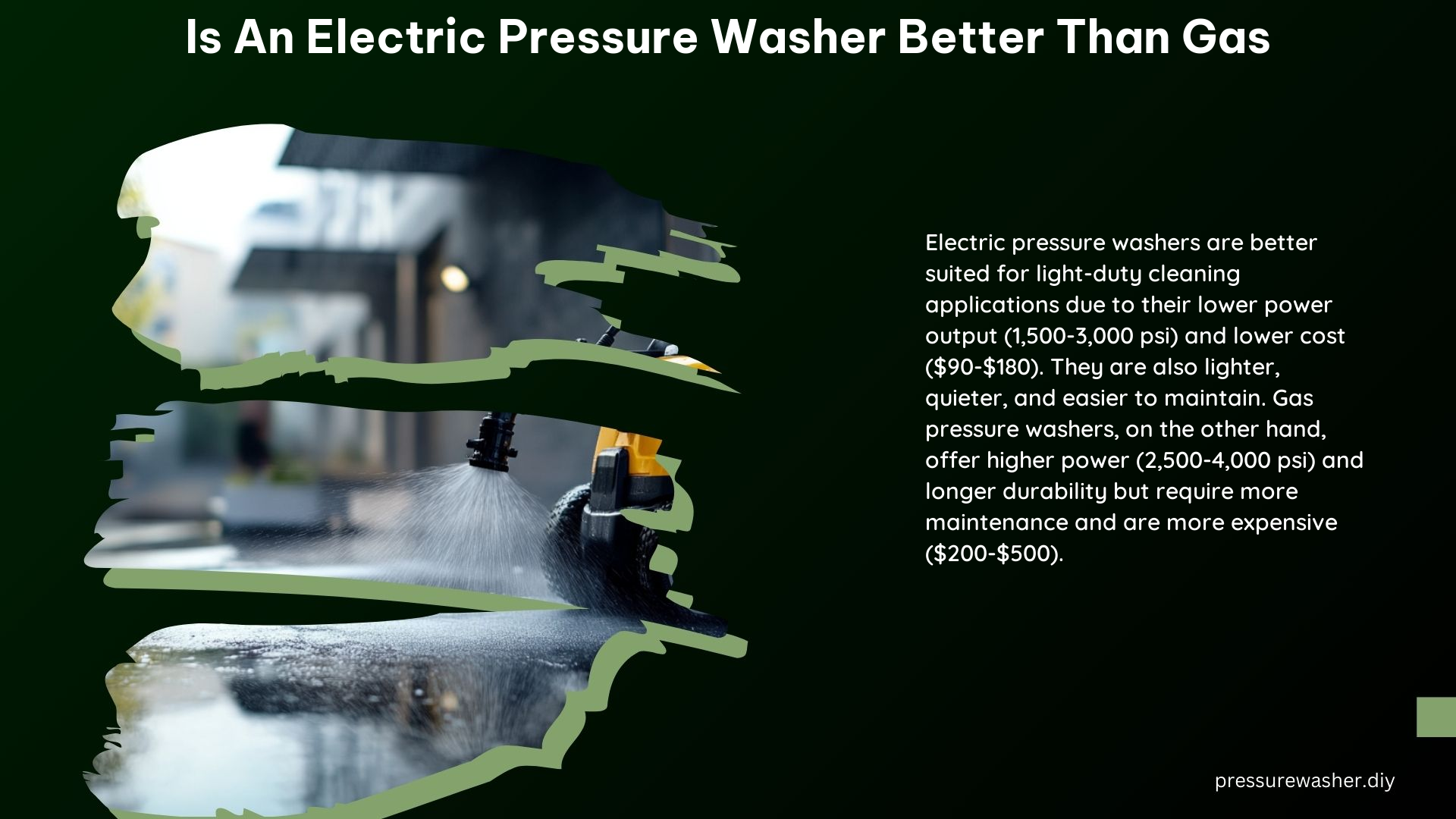When it comes to pressure washers, the choice between electric and gas models can be a bit overwhelming. Both have their own unique advantages and disadvantages, and the decision ultimately depends on your specific cleaning needs, budget, and personal preferences. In this comprehensive guide, we’ll dive deep into the technical details and explore the key factors that can help you determine whether an electric pressure washer or a gas pressure washer is the better choice for your needs.
Power Output and Performance
One of the primary differences between electric and gas pressure washers is their power output. Gas pressure washers typically offer higher power, with a range of 2,500 to 4,000 psi (pounds per square inch), while electric pressure washers generally have a lower power output, ranging from 1,500 to 3,000 psi.
The higher power output of gas pressure washers makes them better suited for heavy-duty cleaning tasks, such as removing stubborn stains, scrubbing stone walkways, or cleaning off graffiti. These powerful machines can tackle even the toughest cleaning jobs with ease, making them the preferred choice for professional contractors or those with extensive cleaning needs.
On the other hand, electric pressure washers, while not as powerful, are still capable of handling a wide range of light-to-medium cleaning tasks, such as washing cars, cleaning patios, or removing dirt and grime from outdoor furniture. Their lower power output can be an advantage for those who need a more gentle cleaning approach or who are working in confined spaces where the higher power of a gas model could be overkill.
Portability and Maneuverability

Another key consideration is the portability and maneuverability of the pressure washer. Electric pressure washers are generally lighter and more compact than their gas-powered counterparts, making them easier to transport and maneuver around the work area.
The average weight of an electric pressure washer ranges from 15 to 30 pounds, while gas pressure washers can weigh anywhere from 50 to 100 pounds or more, depending on the model and features. This weight difference can be a significant factor, especially for those who need to move the pressure washer around frequently or store it in a tight space.
The portability of electric pressure washers also extends to their power source. Since they are powered by electricity, they don’t require the bulky fuel tanks and engines found in gas models. This means you can easily move an electric pressure washer from one outlet to another, making it more versatile for use in different locations.
Maintenance and Operational Costs
Maintenance is another important consideration when choosing between an electric and a gas pressure washer. Electric pressure washers generally require less maintenance than their gas-powered counterparts.
Gas pressure washers have more moving parts, including the engine, fuel system, and air filters, which need regular maintenance and servicing to keep them running at peak performance. This can include tasks such as oil changes, spark plug replacements, and carburetor adjustments. Neglecting these maintenance tasks can lead to decreased performance and even premature failure of the pressure washer.
In contrast, electric pressure washers have fewer moving parts and require minimal maintenance, such as occasional cleaning of the pump and hoses. This makes them a more low-maintenance option, especially for homeowners who may not have the time or expertise to perform regular maintenance on a gas-powered machine.
Additionally, the operational costs of an electric pressure washer are typically lower than a gas model. While the initial purchase price of an electric pressure washer may be higher, the ongoing costs of electricity are generally less than the cost of gasoline and oil required to run a gas-powered machine.
Noise and Emissions
Another factor to consider is the noise and emissions produced by the pressure washer. Gas pressure washers are generally louder than their electric counterparts, with noise levels ranging from 80 to 95 decibels (dB). This can be a significant issue for those who need to use the pressure washer in residential areas or other noise-sensitive environments.
Electric pressure washers, on the other hand, are much quieter, with noise levels typically ranging from 65 to 80 dB. This makes them a more suitable choice for use in urban areas, near neighbors, or in situations where noise pollution is a concern.
Additionally, gas pressure washers produce exhaust emissions, which can be a concern for those who are environmentally conscious or working in enclosed spaces. Electric pressure washers, being powered by electricity, do not produce any direct emissions, making them a more eco-friendly option.
Cost Considerations
The cost of the pressure washer is another important factor to consider. Electric pressure washers are generally less expensive than gas models, with prices ranging from $90 to $180 for a basic electric model, compared to $200 to $500 for a gas pressure washer.
However, it’s important to note that the initial purchase price is not the only cost to consider. The ongoing operational costs, such as electricity or fuel, as well as maintenance and repair expenses, should also be factored into the overall cost of ownership.
Choosing the Right Pressure Washer
When deciding between an electric or gas pressure washer, it’s essential to carefully evaluate your specific cleaning needs, budget, and personal preferences. If you have light-to-medium cleaning tasks, an electric pressure washer may be the better choice, as it is more cost-effective, easier to maintain, and quieter in operation.
On the other hand, if you have heavy-duty cleaning requirements, such as removing stubborn stains or cleaning large areas, a gas pressure washer may be the more suitable option, as it offers higher power output and better performance for these types of tasks.
Ultimately, the decision between an electric or gas pressure washer comes down to finding the right balance between power, portability, maintenance, and cost to meet your unique cleaning needs.
